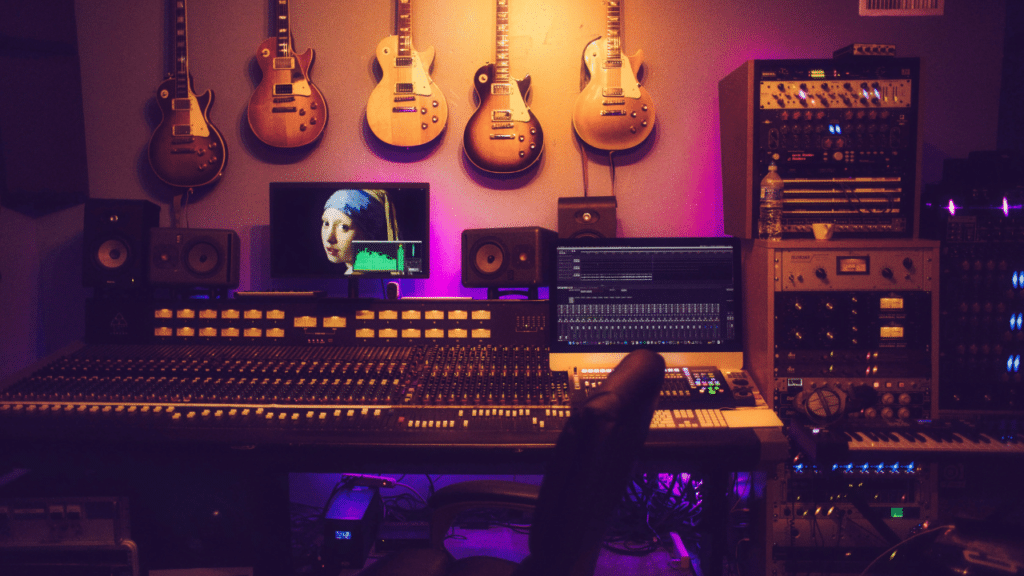The music business has evolved dramatically in recent years, primarily due to the influence of digital platforms and social media. These changes have opened up new opportunities for artists, producers, and entrepreneurs, but they have also increased competition within the industry. The rise of streaming services, affordable production tools, and online marketing have made it easier for artists to share their music globally. However, to stand out in this ever-changing market, a strategic approach combining creativity and business expertise is vital.
Navigating the modern music industry requires more than just talent; it demands strong brand-building, networking, and financial management skills. Whether you’re an established artist or just starting, understanding the importance of digital presence and cultivating relationships in the industry can be game-changers. Developing a roadmap for success in the music business involves leveraging the right strategies, such as engaging with fans through social media and staying adaptable to new trends. By embracing these principles, musicians can achieve long-term success and sustainability in their careers.
Understanding the Music Business Landscape
The music industry is vast and multifaceted, involving several interconnected sectors that help bring music from the artist to the listener. These sectors include production, distribution, live performances, management, and marketing, each serving a unique role. To succeed in the music industry, professionals must understand how these areas function and collaborate. This knowledge can help aspiring artists and entrepreneurs navigate the complex landscape. With insights into these sectors, one can make informed decisions, strategically advancing their career.
Key Sectors in the Music Industry

The production sector is where music creation begins, with artists, producers, and sound engineers working together to craft songs. Once produced, music moves into the distribution phase, where platforms like streaming services and physical sales channels ensure it reaches audiences worldwide. Live performances provide artists with a direct connection to their fans, becoming a vital source of income and fan engagement. Meanwhile, management focuses on handling business aspects, career planning, and contracts, making it essential for navigating the complexities of the industry. Finally, marketing ties everything together by promoting music and artists through digital marketing, PR, and social media.
Building a Strong Brand
market, a strong, recognizable brand is crucial for artists and music professionals. Your brand should reflect your music style, values, and unique identity, allowing you to stand out from the crowd. This involves not only your music but also how you present yourself visually, communicate with your audience, and manage your public image. Artists with a clear and consistent brand are more likely to attract dedicated fans and business opportunities. Additionally, a strong brand helps to ensure long-term success in an ever-evolving industry.
The Role of Social Media in the Music Industry
Social media platforms are one of the most powerful tools available to musicians today. With platforms like Instagram, TikTok, and YouTube, artists can reach a global audience, engage with fans, and build their following. Social media marketing allows artists to release teasers, share behind-the-scenes content, and promote upcoming releases. It also provides a space for direct interaction with fans, building relationships and loyalty. In the modern music industry, leveraging social media effectively can make all the difference in an artist’s career trajectory.
The Importance of Networking
Networking is essential in the music industry. Building relationships with other artists, producers, managers, and industry professionals opens doors to opportunities. Collaborations with other artists can expose you to new audiences while connecting with key industry figures can lead to valuable partnerships, promotions, and gigs. Attending events like music conferences, workshops, and shows is a great way to network and establish your presence within the community. In an industry driven by connections, knowing the right people can significantly impact your career success.
Financial Management for Artists
Managing finances is one of the most overlooked yet essential aspects of a music career. From income earned through royalties and performance fees to budgeting for production costs, artists must understand how to handle their finances effectively. Working with financial advisors or accountants can help ensure proper tax management, budgeting, and long-term financial stability. Proper financial planning allows artists to reinvest in their careers, produce high-quality music, and plan for future projects. By understanding the financial side of the industry, artists can avoid financial pitfalls and ensure a sustainable career.
The Power of Live Performances
Live performances are not only an opportunity for artists to showcase their music but also a significant revenue stream. Concerts, tours, and festivals give fans a chance to experience music in person, creating lasting connections with the artist. Beyond ticket sales, live performances generate income through merchandise, sponsorships, and brand partnerships. Touring also allows artists to reach new markets, further expanding their fanbase. As the live music scene continues to grow, musicians who can deliver an unforgettable live experience are more likely to succeed in the competitive music landscape.
Adapting to Industry Trends
The music industry is constantly evolving, with new trends, technologies, and platforms emerging regularly. To remain competitive, artists and professionals must stay adaptable and open to change. Embracing new technologies like AI-driven music production, virtual reality concerts, and evolving streaming platforms can provide an edge in a fast-paced market. Being aware of these trends and incorporating them into your strategy will keep you ahead of the curve. Adapting to industry shifts ensures that your career stays relevant and can evolve with the changing times.
| Area | Description | Importance |
| Music Production | Involves recording, arranging, and producing music. | Fundamental to creating high-quality content. |
| Music Distribution | The delivery of music to platforms like Spotify, and Apple Music. | Ensures your music reaches global audiences. |
| Live Performances | Concerts, festivals, and touring as a source of revenue. | Provides exposure and builds a fan base. |
| Music Marketing | Promoting music to reach listeners through ads, and social media. | Essential for gaining visibility and growing a following. |
| Management & Booking | Coordinating the artist’s career and organizing gigs. | Helps streamline operations and secure opportunities. |
Effective Music Marketing Strategies
Marketing is one of the most critical components of success in the music industry. Even the most talented musicians may struggle if they do not effectively promote their work. Below are some of the most effective music marketing strategies for artists in today’s landscape.
Social Media Presence
Building a strong presence on social media is essential for musicians today. Platforms such as Instagram, Twitter, TikTok, and Facebook provide a direct line to fans, allowing artists to connect with their audience, promote new releases, and share personal insights. Here are some tips:
- Consistency is Key: Post regularly to keep your audience engaged.
- Engage with Followers: Respond to comments and direct messages to build a loyal fanbase.
- Use Hashtags: Incorporate trending and relevant hashtags to increase visibility.
Content Creation Beyond Music
While music is at the heart of your brand, diversifying your content can help you stand out. Here are some content ideas to mix in:
- Behind-the-Scenes Footage: Fans love seeing what goes on behind the music, whether it’s recording in the studio or preparing for a show.
- Vlogs or Live Streams: Hosting live streams and vlogs can make you more relatable to your fans.
- Collaborations: Partnering with other artists or influencers can expand your reach.
Leverage Streaming Platforms
Streaming platforms like Spotify, Apple Music, and YouTube are crucial for getting your music to listeners worldwide. Here’s how to leverage them effectively:
- Distribute on Multiple Platforms: Ensure your music is available across as many platforms as possible.
- Engage with Curators: Reach out to playlist curators to get your music featured on influential playlists.
- Optimize Your Profile: Make sure your artist profiles on these platforms are complete and professional.
Building Relationships in the Music Industry
Networking plays a vital role in progressing within the music industry. Establishing strong relationships with other musicians, producers, managers, and key industry professionals is crucial for unlocking opportunities. The music industry thrives on connections, and those who actively network can gain access to resources, advice, collaborations, and gigs that may otherwise be out of reach. Building a solid network can also help you stay informed about industry trends and opportunities while offering support as you navigate your career. Here are some effective strategies to help you build valuable relationships:
Attend Music Conferences and Events
Music conferences and industry events like SXSW, MIDEM, and local music gatherings are incredible places to meet like-minded professionals. These events provide opportunities to connect with industry veterans, exchange ideas, and attend seminars and workshops that cover important aspects of the business. Networking at these conferences can lead to collaborations, introductions to producers, and insight into emerging trends. Furthermore, engaging with others at such events allows you to form lasting relationships that can benefit your career in the long run.
Collaborate with Other Artists
Collaborating with fellow musicians is one of the most effective ways to grow your fanbase and gain exposure. Working together on new songs, performances, or projects can help you tap into new audiences who might not have discovered your music otherwise. Collaborations offer fresh perspectives, allowing you to experiment with different sounds and ideas. Even if you don’t release joint projects, co-writing songs, producing together, or helping each other with promotional efforts can open doors to further opportunities and new connections.
Seek Out a Mentor
Mentorship is a powerful tool for career development in the music industry. A mentor who has experience in the industry can offer invaluable advice, help you avoid common pitfalls, and guide you through complex business decisions. In addition to providing strategic direction, a mentor can introduce you to influential contacts that might otherwise be difficult to access. By seeking out someone whose career you admire, you can gain industry insights that will give you a competitive edge, helping you make better decisions in your career.
Monetizing Your Music Career
- Live Performances and Touring: Live performances are one of the most significant revenue sources for musicians. Concerts, tours, and festivals not only provide ticket sales income but also generate money through merchandise sales, sponsorships, and exclusive VIP experiences.
- Music Streaming Royalties: Streaming platforms like Spotify, Apple Music, and YouTube offer royalty payments based on how many times your music is played. While the per-stream payout may be low, a strong catalog and consistent streaming numbers can add up over time.
- Merchandise Sales: Selling branded merchandise such as t-shirts, posters, and accessories is another profitable revenue stream. Merchandise sales allow artists to profit from their fan base while promoting their brand.
- Licensing for TV, Film, and Commercials: Licensing your music for use in TV shows, films, or commercials is an excellent way to generate passive income. It’s a win-win, as it exposes your music to new audiences while providing you with royalties.
- Crowdfunding and Fan Suppor: Platforms like Patreon or Kickstarter allow artists to seek direct support from their fans. Fans can subscribe for exclusive content or back album projects, providing upfront funding that enables artists to continue creating.
- Brand Partnerships and Sponsorships: Collaborating with brands for sponsored content or promotional campaigns offers another income stream. Companies often look for artists whose values align with their brand, offering opportunities for paid endorsements or product collaborations.
Staying Ahead with Music Business Trends
The music industry is constantly evolving, and staying ahead of trends is vital for remaining relevant. In 2025 and beyond, key trends include the rise of NFTs, allowing artists to monetize exclusive digital content through blockchain. Virtual concerts continue to thrive, offering global access to live performances. AI tools are transforming music creation by streamlining production processes. Social media remains a powerful marketing tool for direct fan engagement. Additionally, subscription-based models like Patreon provide sustainable income streams for artists, while the globalization of music consumption opens new markets for international collaborations. These trends will shape the future of
The Rise of NFTs in Music
Non-fungible tokens (NFTs) are revolutionizing the music industry by offering artists a new way to sell digital music and exclusive content. With NFTs, artists can tokenize their music, giving fans ownership of unique digital assets. This trend is growing rapidly as artists explore ways to monetize their work through blockchain technology, allowing them to sell limited edition tracks, albums, or behind-the-scenes content directly to fans. NFTs provide an innovative method to engage with fans while offering new financial opportunities for musicians, and this trend is set to expand in 2025 and beyond.
Virtual Concerts and Experiences
The pandemic has solidified virtual concerts as an important facet of the music industry, and even with in-person events making a comeback, virtual experiences are here to stay. Streaming live performances, offering virtual meet-and-greets, and hosting exclusive online events enable musicians to connect with global fans who may not be able to attend physical shows. Virtual concerts also offer unique interactive features, allowing fans to experience the show in innovative ways, such as choosing camera angles or interacting with the artist during the event. As virtual technology continues to improve, virtual concerts will remain a valuable tool for musicians to broaden their reach.
Artificial Intelligence in Music Creation
AI is becoming a game-changer in music production, enabling artists to create high-quality music more efficiently and with innovative sound design. From generating beats to mastering tracks, AI technology is streamlining the production process, helping musicians cut down on time-consuming tasks and focus more on creativity. With AI tools, independent artists can produce professional-quality music even without access to expensive studios. As AI continues to improve, it’s expected to play an even bigger role in shaping how music is composed, arranged, and produced, offering endless creative possibilities.
Social Media as a Key Marketing Tool
Social media remains one of the most powerful marketing tools for artists to connect directly with fans. Platforms like Instagram, TikTok, and YouTube offer musicians the ability to engage with their audience, showcase behind-the-scenes content, and share their music in creative ways. Social media’s viral nature can turn an unknown artist into a global sensation overnight. Artists who strategically use social media to build their brand, share regular content, and interact with followers are more likely to succeed in reaching a wider audience and maintaining long-term relevance in the music industry.
Subscription-Based Revenue Models
Subscription services like Patreon are transforming how musicians make money by offering a more consistent and sustainable income stream. Fans can subscribe to their favorite artists for exclusive content, early access to music, and personalized experiences. This model allows artists to build a community around their music and secure recurring revenue while engaging more deeply with their most loyal fans. As artists seek greater control over their financial future, subscription-based platforms will continue to grow as an effective means to monetize their music and content beyond traditional album sales and streaming royalties.
Globalization of Music Consumption
Music has become increasingly global, with streaming platforms like Spotify, Apple Music, and YouTube offering access to global audiences. Artists no longer need to be confined to local markets and can reach listeners around the world with ease. As more people worldwide discover music from different cultures and genres, the demand for international collaborations and cross-genre fusions grows. The globalization of music consumption presents opportunities for musicians to expand their fanbase internationally, collaborate with global artists, and tap into new markets that were previously inaccessible. The ability to connect with fans from all over the world is shaping the future of the music business.
Wrapping Up
succeeding in the music business requires more than just talent—it’s about smart strategies, strong branding, and staying informed about industry trends. By focusing on both the artistic and business aspects of the industry, music professionals can set themselves up for long-term success. From using social media to engage with fans to understanding the nuances of contracts and royalties, the tools for success are within reach for those who are dedicated and prepared.
With a clear vision and the right strategies, anyone can carve out a niche in the competitive world of music. Whether you’re an artist looking to grow your fan base or an entrepreneur seeking to launch a music-related business, the key is to stay proactive, keep learning, and be willing to adapt to the ever-changing industry. The music industry may be challenging, but with the right approach, success is more than possible.
FAQs
How can I get my music noticed in a crowded industry?
Consistent social media presence, networking, and collaborating with other artists can help your music stand out. Engaging with your fanbase and ensuring your music is available on streaming platforms will also increase visibility. Don’t forget to keep learning about marketing and the business side of things to grow your career.
Should I focus more on live performances or music production?
Both are important, but it depends on your goals. Live performances can help build a strong fanbase, while music production is necessary for creating content. A balance of both will help you grow as an artist and maximize your revenue streams.
How do I approach music licensing and get my music in movies or TV shows?
Start by registering your music with a performing rights organization (PRO), such as ASCAP or BMI. You can also sign up with music libraries and licensing agencies that specialize in placing music in movies, TV shows, and commercials.
What’s the best way to handle music royalties?
Ensure you register with a PRO to track your music’s use and receive royalties. You can also work with a music lawyer to understand your rights and ensure you’re getting fair compensation from all income streams.
How can I make money from streaming platforms?
Make your music available on as many platforms as you can. Additionally, you can promote your music to playlist curators and engage your fans through social media to increase streams. The more your music is heard, the more you’ll earn from streaming royalties.
Is it necessary to hire a manager early in my career?
It’s not necessary, but it can be helpful if you are focusing on building your brand and need guidance. A manager can help with bookings, negotiations, and career planning, allowing you to focus on your music.
How do I get started in music production?
Invest in basic equipment and software to begin learning music production. You can also take online courses or workshops to improve your skills. Networking with other producers and artists can also provide valuable opportunities.










